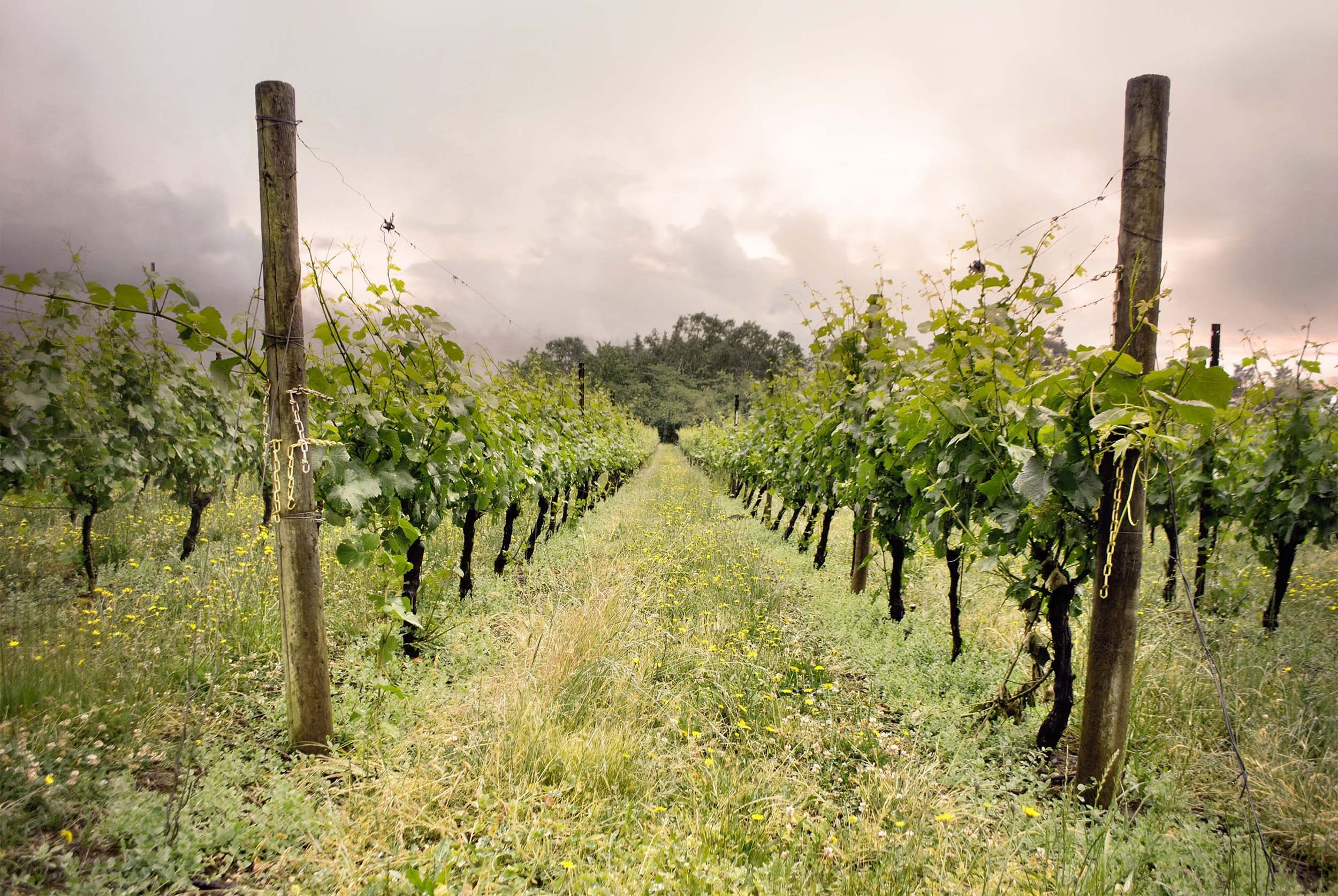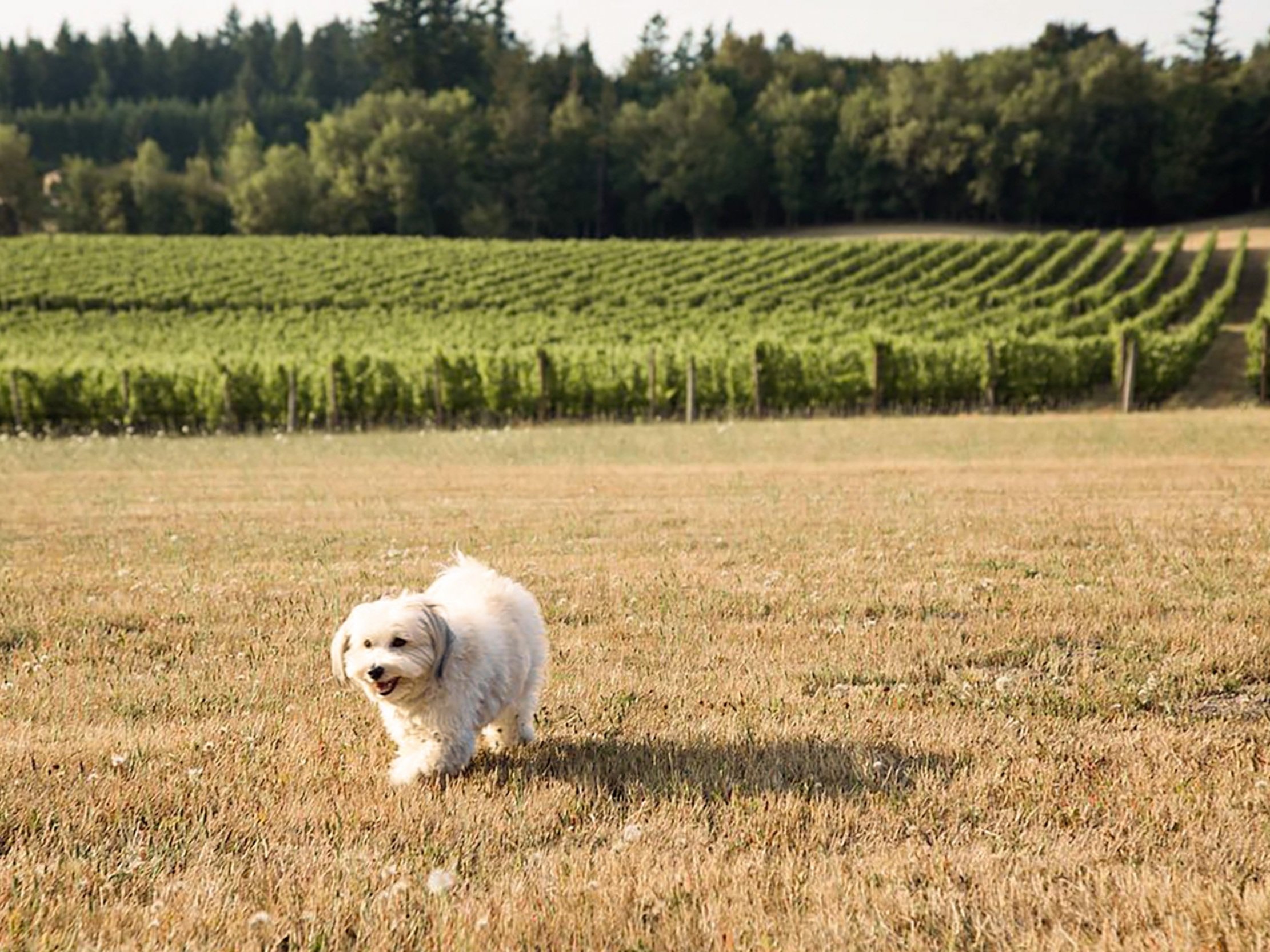
Vineyards.

Poverty Bend
WILLAMETTE VALLEY AVA
established
1989
varieties
Pinot Noir, Pinot Gris, Gewürztraminer, Riesling, Muscat Canelli
primary soil
Woodburn series, is relatively young in comparison to the regions’ volcanic, sedimentary and wind-deposited soils. Starting 18,000 years back, a progression of massive freshwater floods from glacial lakes in western Montana swept into Washington and down into the Willamette Valley through the Columbia River Gorge. The resulting stratified deposits of silt, clay and sand now comprise the low-lying earth of the valley floor. Deep and high in organic matter, vigor is often managed to capture the fragrant, bright and expressive characteristics derived from these vineyard-friendly soils.
farming
Non-irrigated, practicing sustainable
orientation
3.78 acres 125-155' SE slope
Poverty Bend
WILLAMETTE VALLEY AVA
established
1989
varieties
Pinot Noir, Pinot Gris, Gewürztraminer, Riesling, Muscat Canelli
primary soil
Woodburn series, is relatively young in comparison to the regions’ volcanic, sedimentary and wind-deposited soils. Starting 18,000 years back, a progression of massive freshwater floods from glacial lakes in western Montana swept into Washington and down into the Willamette Valley through the Columbia River Gorge. The resulting stratified deposits of silt, clay and sand now comprise the low-lying earth of the valley floor. Deep and high in organic matter, vigor is often managed to capture the fragrant, bright and expressive characteristics derived from these vineyard-friendly soils.
farming
Non-irrigated, practicing sustainable
orientation
3.78 acres 125-155' SE slope
La Cantera
CHEHALEM MOUNTAINS AVA
established
1986
varieties
Pinot Noir (Pommard, Wädenswil, 114, 667, 777, Hanzel)
primary soil
Laurelwood Series, Oregon's rarest soil series, is composed of fine-grained, wind-deposited silt, called loess. The shallowest of the Willamette Valley’s three main soil types, Laurelwood was deposited over ancient basalt throughout the last glacial period. These fertile, well-draining soils convey distinct character in Pinot Noir. Elegance, complexity and aromas of bright red cherry, sweet baking spice and hints of white pepper are commonly observed in Laurelwood wines.
farming
Non-irrigated, LIVE Certified Sustainable,
Certified Salmon-Safe
orientation
28 acres 600-684' S/SW slope
La Cantera
CHEHALEM MOUNTAINS AVA
established
1986
varieties
Pinot Noir (Pommard, Wädenswil, 114, 667, 777, Hanzel)
primary soil
Laurelwood Series, Oregon's rarest soil series, is composed of fine-grained, wind-deposited silt, called loess. The shallowest of the Willamette Valley’s three main soil types, Laurelwood was deposited over ancient basalt throughout the last glacial period. These fertile, well-draining soils convey distinct character in Pinot Noir. Elegance, complexity and aromas of bright red cherry, sweet baking spice and hints of white pepper are commonly observed in Laurelwood wines.
farming
Non-irrigated, LIVE Certified Sustainable,
Certified Salmon-Safe
orientation
28 acres 600-684' S/SW slope
Yamhill Springs
YAMHILL-CARLTON AVA
established
1988
varieties
Pinot Noir (Clones Wädenswil, 777, 115, 113),
Chardonnay, Pinot Gris
primary soil
Peavine Series consists of moderately deep colluvial soils derived from sandstone, siltstone, basalt, tuffaceous rock and shale. With low water retention and poor nutrients, establishing a dry-farmed vineyard is ambitious, but once acclimated, the vines tend to produce clusters with small berries and few seeds. The wines exhibit deep, concentrated fruit flavors and notes of mocha or cocoa. Jory Series, Oregon’s flagship dirt, is basalt-based, volcanic in origin and easily recognizable by its iron-rich reddish color. Predominantly found in the Dundee Hills and smaller pockets in the surrounding AVAs. Wines from Jory soils are bright and high-toned with distinct red cherry flavors and voluminous perfume notes that present an almost candied profile.
farming
Own-rooted, non-irrigated, practicing sustainable
orientation
20 acres 419-576' W slope
Yamhill Springs
YAMHILL-CARLTON AVA
established
1988
varieties
Pinot Noir (Clones Wädenswil, 777, 115, 113),
Chardonnay, Pinot Gris
primary soil
Peavine Series consists of moderately deep colluvial soils derived from sandstone, siltstone, basalt, tuffaceous rock and shale. With low water retention and poor nutrients, establishing a dry-farmed vineyard is ambitious, but once acclimated, the vines tend to produce clusters with small berries and few seeds. The wines exhibit deep, concentrated fruit flavors and notes of mocha or cocoa. Jory Series, Oregon’s flagship dirt, is basalt-based, volcanic in origin and easily recognizable by its iron-rich reddish color. Predominantly found in the Dundee Hills and smaller pockets in the surrounding AVAs. Wines from Jory soils are bright and high-toned with distinct red cherry flavors and voluminous perfume notes that present an almost candied profile.
farming
Own-rooted, non-irrigated, practicing sustainable
orientation
20 acres 419-576' W slope
Sylvia's
EOLA-AMITY HILLS AVA
established
2005
varieties
Pinot Noir
primary soil
Nekia, the signature soil of the Eola-Amity Hills, plays a key role in the style of wine produced in this region. While mostly volcanic in origin, Nekia differs from the Jory soils of the Dundee Hills with the inclusion of marine sedimentary deposits and lower percentages of clay. Often less than 3 feet in depth, these shallow, dry soils are known to encourage early ripening and the regions' vineyards are often among the earliest to be picked. The soil is instrumental in producing compellingly dark-fruited Pinot Noirs with flavors of blackberry, plum, blueberry and cassis. Wines are typically bold in structure and balanced with naturally high acidity levels.
farming
Non-irrigated, practicing sustainable
orientation
8 acres 272-380' SE slope
Sylvia's
EOLA-AMITY HILLS AVA
established
2005
varieties
Pinot Noir
primary soil
Nekia, the signature soil of the Eola-Amity Hills, plays a key role in the style of wine produced in this region. While mostly volcanic in origin, Nekia differs from the Jory soils of the Dundee Hills with the inclusion of marine sedimentary deposits and lower percentages of clay. Often less than 3 feet in depth, these shallow, dry soils are known to encourage early ripening and the regions' vineyards are often among the earliest to be picked. The soil is instrumental in producing compellingly dark-fruited Pinot Noirs with flavors of blackberry, plum, blueberry and cassis. Wines are typically bold in structure and balanced with naturally high acidity levels.
farming
Non-irrigated, practicing sustainable
orientation
8 acres 272-380' SE slope
Gary! PHO – Kelly Robinson
Robinson
WILLAMETTE VALLEY AVA
established
1999
varieties
Pinot Noir, Chardonnay
primary soil
Cascade series, extensive in northwest Oregon, consists of poorly drained silty loam that was blown up from the valley over the millennia. Containing very little coarse material or rock fragments, dense Cascade soils can present clay-like in consistency while containing relatively small percentages of true clay. Considered some of the best agricultural soils in the country, vine balance and vigor management is an important consideration when farming in these soils. Balance is achieved when vegetative and reproductive growth can be sustained while maintaining healthy canopy growth, adequate fruit production, and desired fruit quality (sugar levels, acid balance, and flavor compounds).
farming
Practicing sustainable, Certified Salmon-Safe, Certified Fish Friendly Farming
orientation
8.7 acres 482-570' S slope
Gary! PHO – Kelly Robinson
Robinson
WILLAMETTE VALLEY AVA
established
1999
varieties
Pinot Noir, Chardonnay
primary soil
Cascade series, extensive in northwest Oregon, consists of poorly drained silty loam that was blown up from the valley over the millennia. Containing very little coarse material or rock fragments, dense Cascade soils can present clay-like in consistency while containing relatively small percentages of true clay. Considered some of the best agricultural soils in the country, vine balance and vigor management is an important consideration when farming in these soils. Balance is achieved when vegetative and reproductive growth can be sustained while maintaining healthy canopy growth, adequate fruit production, and desired fruit quality (sugar levels, acid balance, and flavor compounds).
farming
Practicing sustainable, Certified Salmon-Safe, Certified Fish Friendly Farming
orientation
8.7 acres 482-570' S slope
Carlton Hill
YAMHILL-CARLTON AVA
established
1999
varieties
Pinot Noir (Pommard, Wädenswil, 777, 115)
primary soil
Willakenzie Series, formed 8,000 feet below the ocean surface, is the best-known sedimentary soil in the Willamette Valley. Exposed when tectonic upheaval lifted the seabed and created the Cascade Mountains, these dusty, mustard-tinted soils are responsible for making powerful, complex wines. With very little water retention, vines are forced to establish extraordinarily deep roots systems in search of water. The resulting wines are inherently age-worthy with dense dark fruit, violet floral aromas and sweet spice and tobacco aromas common signature elements.
farming
Non-irrigated, LIVE Certified Sustainable, Certified Salmon-Safe
orientation
12.5 acres 420-480' E slope
notes
Carlton Hill’s east facing slopes pick up the early morning sun, lending gentle ripening and shady relief in the hot afternoons. Sustainably farmed, this vineyard consistently delivers outstanding Pinot Noir known for robust, red-fruited characteristics. Its weaves ripe, exotic elements with youthful forwardness effortlessly shines in our Articulate Pinot Noir.
Carlton Hill
YAMHILL-CARLTON AVA
established
1999
varieties
Pinot Noir (Pommard, Wädenswil, 777, 115)
primary soil
Willakenzie Series, formed 8,000 feet below the ocean surface, is the best-known sedimentary soil in the Willamette Valley. Exposed when tectonic upheaval lifted the seabed and created the Cascade Mountains, these dusty, mustard-tinted soils are responsible for making powerful, complex wines. With very little water retention, vines are forced to establish extraordinarily deep roots systems in search of water. The resulting wines are inherently age-worthy with dense dark fruit, violet floral aromas and sweet spice and tobacco aromas common signature elements.
farming
Non-irrigated, LIVE Certified Sustainable, Certified Salmon-Safe
orientation
12.5 acres 420-480' E slope
notes
Carlton Hill’s east facing slopes pick up the early morning sun, lending gentle ripening and shady relief in the hot afternoons. Sustainably farmed, this vineyard consistently delivers outstanding Pinot Noir known for robust, red-fruited characteristics. Its weaves ripe, exotic elements with youthful forwardness effortlessly shines in our Articulate Pinot Noir.











